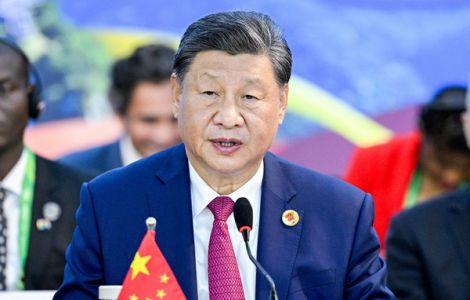中英对照:习近平在二十国集团领导人第十九次峰会第二阶段会议关于“全球治理机构改革”议题的讲话
Working Together for a Fair and Equitable Global Governance System
携手构建公正合理的全球治理体系
Working Together for a Fair and Equitable Global Governance System
——在二十国集团领导人第十九次峰会第二阶段会议关于“全球治理机构改革”议题的讲话
Remarks on Reform of the Institutions of Global Governance at Session II of the 19th G20 Summit
(2024年11月18日,里约热内卢)
Rio de Janeiro, November 18, 2024
中华人民共和国主席习近平
By H.E. Xi Jinping, President of the People’s Republic of China
尊敬的卢拉总统,
各位同事:
Your Excellency President Luiz Inácio Lula da Silva,
Colleagues,
二十国集团领导人峰会已经走过16年历程。这些年,我们同舟共济、应对国际金融危机,推动全球经济、金融、贸易等领域合作,带领世界经济走上复苏之路。我们勠力同心、直面全球挑战,共同应对气候变化,抗击新冠疫情,领航技术变革,不断赋予二十国集团新的责任和使命。我们携手同行、完善全球治理,加强宏观经济政策协调,推动国际金融机构改革,以平等协商、互利共赢精神引领国际合作。
It has been 16 years since the G20 Summit was launched. Over the years, we have worked in solidarity to tackle the global financial crisis, promoted cooperation on global economy, finance and trade, and steered the world economy onto the track of recovery. We have worked in concert to face global challenges head-on, be it climate change or the COVID-19 pandemic, spearheaded technological transformation, and kept renewing the G20’s responsibilities and missions. We have worked in unison to improve global governance, strengthened macroeconomic policy coordination, pressed ahead with reforming the international financial institutions, and championed international cooperation in the spirit of equal consultation and mutual benefit.
站在新的起点上,二十国集团应该承前启后、继往开来,继续做完善全球治理、推动历史进步的力量。我们应该秉持人类命运共同体理念,相互视对方的发展为机遇而非挑战,相互把对方作为伙伴而非对手;恪守以联合国宪章宗旨和原则为基础的国际关系基本准则,维护以国际法为基础的国际秩序。应该结合二十国集团职能,在经济、金融、贸易、数字、生态环境等领域进一步凝聚国际共识,完善全球治理,促进平等有序的世界多极化、普惠包容的经济全球化。
Proceeding from a new starting point, the G20 needs to build on its past achievements and continue to act as a force to improve global governance and move history forward. We should keep in mind that mankind lives in a community with a shared future, see each other’s development as opportunities rather than challenges, and view each other as partners rather than rivals. We should observe the basic norms of international relations underpinned by the purposes and principles of the U.N. Charter and defend the international order based on international law. In light of the G20’s mandate, we could build greater international consensus in the economic, financial, trade, digital and eco-environmental fields, among others, to improve global governance and promote an equal and orderly multipolar world and a universally beneficial and inclusive economic globalization.
第一,完善全球经济治理,建设合作型世界经济。我们已经制定二十国集团全面增长战略,建立强劲、可持续、平衡和包容增长框架。当前,要致力于加强全球经济伙伴关系,在财政、金融、货币、结构性改革方面加强宏观政策协调,培育新质生产力,提高全要素生产率,为世界经济开辟更广阔发展空间。要用好二十国集团财长和央行行长会议机制,打造宏观政策协调的“稳定器”,营造开放、包容、非歧视的国际经济合作环境。国际金融机构和商业债权人作为主要债权方,应该参与对发展中国家减缓债行动。要营造风清气正的营商环境,坚持对腐败零容忍,加强追逃追赃国际合作,不为腐败分子及其资产提供“避风港”。
First, we need to improve global economic governance and build a world economy characterized by cooperation. We have developed the G20 comprehensive growth strategies and established a framework for strong, sustainable, balanced and inclusive growth. We should stay committed to strengthening global economic partnerships, reinforcing macro policy coordination in fiscal, financial, monetary and structural reform policies, cultivating new quality productive forces, and raising total factor productivity, in a bid to open up more possibilities for the global economy. It is important to make good use of the G20 Finance Ministers and Central Bank Governors Meetings, let them serve as a ballast for macro policy coordination, and foster an open, inclusive, and nondiscriminatory environment for international economic cooperation. As main creditors, international financial institutions and commercial creditors need to take part in debt reduction and suspension for developing countries. It is also important to create a clean business environment by upholding a zero-tolerance stance against corruption, stepping up international cooperation on fugitive repatriation and asset recovery, and denying safe haven to corrupt officials and their assets.
第二,完善全球金融治理,建设稳定型世界经济。要增加发展中国家话语权和代表性,按照各方商定的时间表和路线图,开展世界银行股权审议,推进国际货币基金组织份额占比调整。要共同维护国际金融市场稳定,防止本国货币政策调整产生负面外溢效应,发达国家在这方面应该承担起责任。要完善金融风险监测、预警、处置体系,加强数字货币、税收等领域合作,筑牢全球金融安全网。要加快落实《二十国集团可持续金融路线图》,更好满足发展中国家绿色融资需求。
Second, we need to improve global financial governance and build a world economy characterized by stability. To increase the voice and representation of developing countries, the World Bank should carry out shareholding review and the International Monetary Fund should carry out quota share realignment in line with the agreed timeframe and roadmap. Joint efforts are needed to keep the international financial market stable and prevent negative spillover of domestic monetary policy adjustments. Developed countries should fulfill their responsibilities in this regard. It is important to enhance the systems for financial risks monitoring, early warning and handling, reinforce cooperation in such areas as digital currency and taxation, and strengthen the global financial safety net. The G20 Sustainable Finance Roadmap should be implemented at a faster pace to better meet the green financing needs of developing countries.
第三,完善全球贸易治理,建设开放型世界经济。要把发展置于国际经贸议程中心地位,持续推动贸易和投资自由化便利化,要继续推进世界贸易组织改革,反对单边主义、保护主义,推动争端解决机制尽快恢复正常运转,并将《促进发展的投资便利化协定》纳入世界贸易组织规则框架,早日就电子商务协定达成一致。要积极推进世界贸易组织规则与时俱进,既要解决长期未决议题,又要积极探索制定面向未来的新规则,提高多边贸易体制的权威性、有效性和相关性。要避免经济问题政治化、人为割裂全球市场,避免以绿色低碳为名、行保护主义之实。两年前,中国同印度尼西亚等国共同发起《产业链供应链韧性与稳定国际合作倡议》,呼吁构建更具平等性、包容性和建设性的产业链供应链伙伴关系,我们愿同各方就此加强合作。
Third, we need to improve global trade governance and build a world economy characterized by openness. We should place development at the center of the international economic and trade agenda, and steadily advance trade and investment liberalization and facilitation. We should press ahead with reforming the World Trade Organization (WTO), oppose unilateralism and protectionism, restore the normal functioning of the dispute settlement mechanism as soon as possible, include the Investment Facilitation for Development Agreement into the WTO legal framework, and reach early consensus on the e-commerce agreement. We should work actively to keep the WTO rules relevant, both addressing long-pending issues and exploring the formulation of new, future-oriented rules, to enhance the authority, efficacy and relevance of the multilateral trading system. It is important to avoid politicizing economic issues, avoid fragmenting the global market, and avoid taking protectionist moves in the name of green and low-carbon development. Two years ago, China and Indonesia, together with some other countries, launched the Initiative of International Cooperation on Resilient and Stable Industrial and Supply Chains, calling for industrial and supply chain partnerships that are more equal, inclusive and constructive. We stand ready for closer cooperation with all sides on this initiative.
注:为确保中英对照准确,“热词译”网站可能对中英文重新分段。

